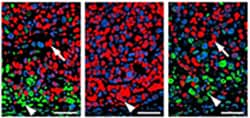 |
By Yoskaly Lazo-Fernandez, PhD
Cancer invasion requires cancerous cells to overpower the barriers of the extracellular matrix and reach adjacent tissues. Invading cells undergo a process called epithelial-mesenchymal transition (EMT), which enables them to dedifferentiate into a highly invasive mesenchymal stem cell-like phenotype. Interestingly, once the cells have reached their new location through metastasis, they undergo a reverse process named mesenchymal-epithelial transition (MET) which allows the solid tumor to reorganize in the distant organ.
Molecular pathways involved in cancer invasion have thus become important targets for anticancer pharmacotherapies. EMT inhibition can be clinically achieved by targeting mitogen-activated protein kinase (MAPK) signaling, for example through epidermal growth factor receptor (EGFR) blocking or mitogen-activated protein kinase kinase (MEK) inhibition. However, the anticancer effects of MAPK signaling inhibition in the clinic have so far been limited1. Targeting other pathways such as NOTCH, involved in cancer cell proliferation have also yielded modest results.
 Treatment with MAPK inhibitor only kills some colon cancer cells in mice. Human colon cancer cells injected into mice form tumors (left) consisting of both MAPK-active cells (green) and NOTCH-active cells (red). Treatment with the MAPK inhibitor selumetinib results in tumors consisting of NOTCH-active cells only (center), but after treatment is stopped, the NOTCH-active cells give rise to new MAPK-active cells, restoring the tumors’ original composition (right). CREDIT: Schmidt et al., 2018
Treatment with MAPK inhibitor only kills some colon cancer cells in mice. Human colon cancer cells injected into mice form tumors (left) consisting of both MAPK-active cells (green) and NOTCH-active cells (red). Treatment with the MAPK inhibitor selumetinib results in tumors consisting of NOTCH-active cells only (center), but after treatment is stopped, the NOTCH-active cells give rise to new MAPK-active cells, restoring the tumors’ original composition (right). CREDIT: Schmidt et al., 2018
A recent article by Schmidt et al. in the Journal of Experimental Medicine has shed new light on how intratumoral heterogeneity and tumor cell plasticity may be contributing to anti MAPK drug resistance 2. The authors analyzed expression and intratumoral distribution of different markers of tumor proliferation, in various in vitro and in vivo models of colorectal cancer. They discovered that in colon cancer, the expression of important tumor progression signaling pathways is distributed in two distinct and mutually exclusive cell subpopulations. First, cells located towards the center of the tumor tend to express elevated
levels of NOTCH and exhibit a relatively more differentiated epithelial phenotype. Second, cells located near the edge of the tumor tend to experience EMT and overactivate MAPK and WNT signaling. Moreover, upon pharmacological inhibition of MAPK or NOTCH signaling respectively in one of these cell subpopulations, they undergo a shift in signaling toward the other subtype. For example, when tumors were treated with the MEK inhibitor selumetinib, MAPK signaling was expectedly eliminated while NOTCH signaling was activated in cells near the edge of the tumor, suggesting that this is a mechanism by which these tumors resist treatment.
|
“Our data support a new concept for cancer therapy that advocates specific and simultaneous targeting of several different tumor cell subpopulations to strongly improve therapy response," Leading author David Horst said in a recent press release. |
The most promising result from this study2, was the strong positive response observed after combined anti NOTCH and anti MAPK treatment in several human colon tumor xenografts mouse models. When each signaling pathway was inhibited separately, the effects were very modest in comparison to a control group of untreated mice. However, upon combined inhibition of both pathways, tumor growth was dramatically reduced, and mouse survival significantly increased. This was at least in part due to a very significant reduction in tumor cell proliferation and an increase in tumor cell apoptosis. Overall this study makes a solid argument for multidrug treatment regimens in cancer, particularly when proliferative pathways are targeted in colon cancer. The efficacy of combined targeting of MAPK and NOTCH pathways in human cancer patients is still unknown, however the results presented in the paper are very exciting, as far as preclinical studies can be.
 Yoskaly Lazo Fernandez, PhD
Yoskaly Lazo Fernandez, PhD
Research Assistant Professor, The University of Kansas Medical Center
Dr. Lazo-Fernandez is interested in the application of novel immunotherapies for the treatment of cancer, particularly ovarian cancer.
References